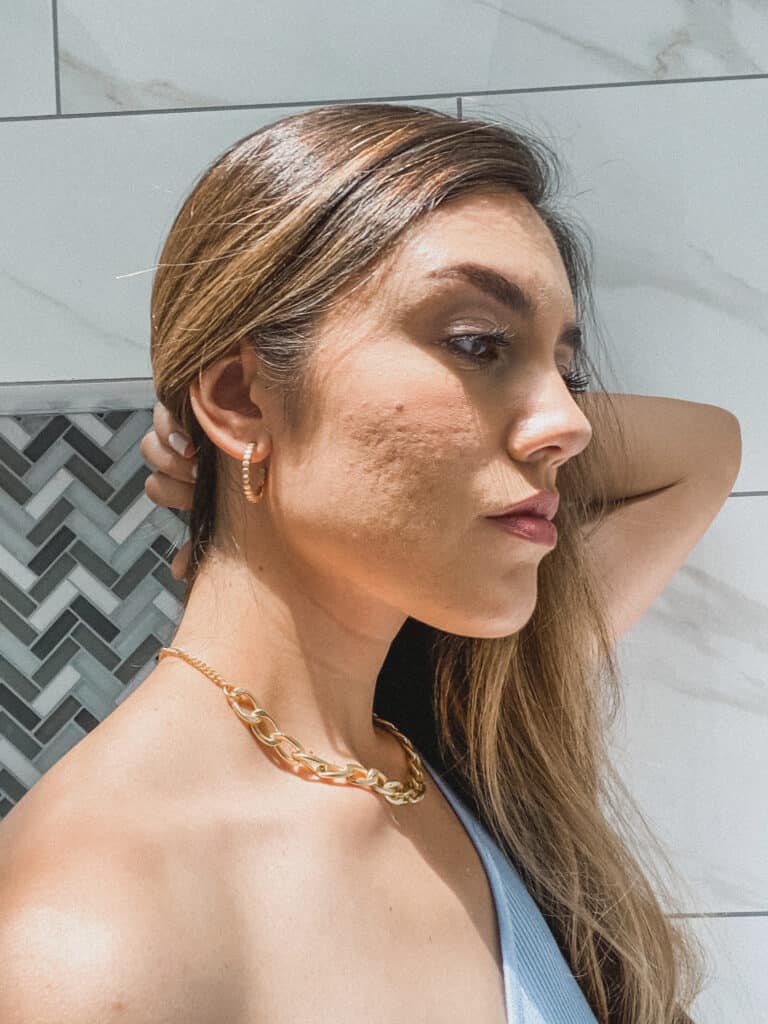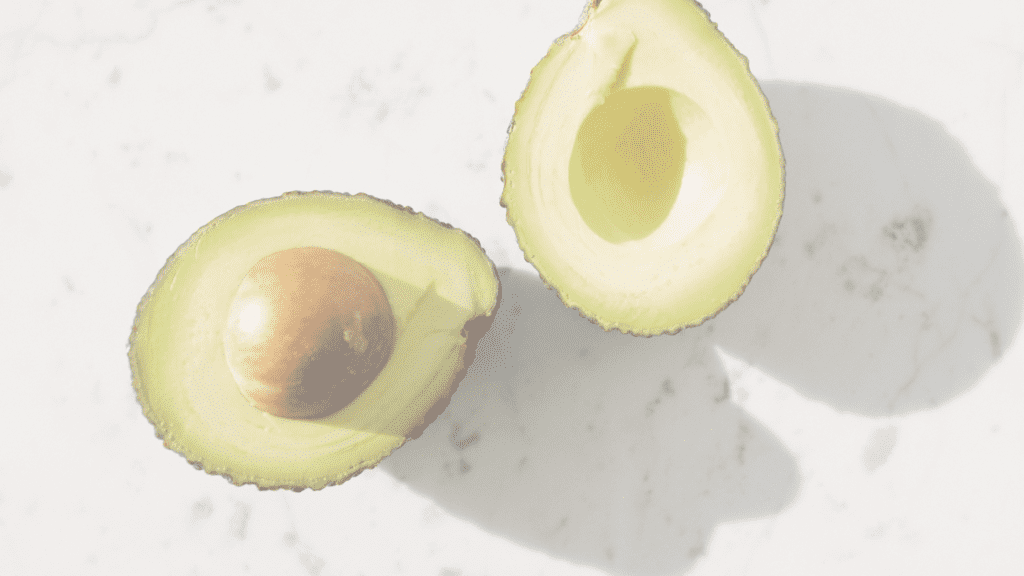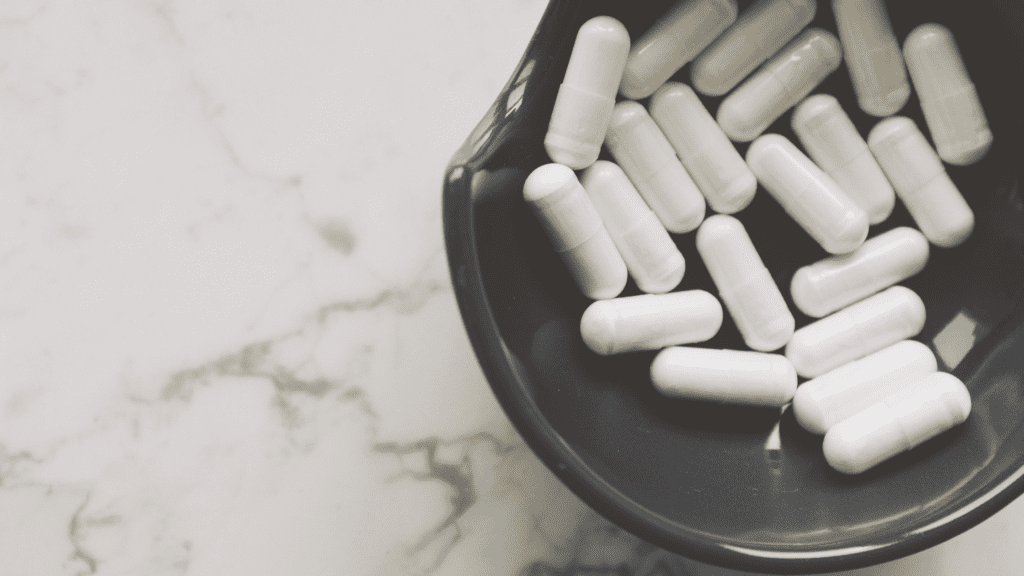About 12 years ago, I finished my last round of isotretinoin (generic name of Accutane) pills to help get rid of my cystic acne. After my experience, you may wonder: is Accutane worth it? I have mixed feelings about certain aspects, but overall I’d say that it was worth it in my personal case. dNevertheless, I do have 5 Accutane alternatives I wish I could have tried to see if it could help my acne before taking this “last resort” medication.
This article will cover all these alternatives in-depth, and hopefully they will help you on your acne journey! Whether you are considering Accutane or not, they might be worth it to try.
Disclosure: This blog post contains affiliate links, which means I make a small commission on a purchase without an additional cost to you if you buy something through the link.
My Cystic Acne Background
I wish I had more pictures of my cystic acne, but back before iPhones it never occurred to me to take a selfie to document the severity of my skin. [Not that I think I would have anyway, haha!]
But, I can show you my old acne scars. You can tell just how severe my acne was by how deep and scarred my skin is.

I honestly can’t remember when I first started getting acne, but I know it was pretty young. Acne is genetic on my dad’s side, I definitely inherited it from him.
Suffering from acne as a teenager, as you may have experienced, is not fun. Despite washing my face diligently day and night, and NEVER going to bed with makeup on, the acne was relentless. I moved on up through birth control pills, creams/topicals, antibiotics, and spironolactone. Nothing could help it, and I felt like my skin got even more stressed out.
Finally, we came to the last resort. My dermatologist got me started on Accutane. I was eager to start with it, as I wanted my acne GONE. I thought I had tried everything, but as you will learn in a bit, there are 5 alternatives that I wish I knew about at the time.
What Is Accutane?
To understand why I believe there could have been alternatives to Accutane that I might have considered, let’s learn more about Accutane itself.
How Does Accutane Work?
Accutane is taken for severe acne. Accutane is the brand name, and commonly used in reference to the drug as a whole. The generic name is isotretinoin.
Isotretinoin is a retinoic acid (metabolite of Vitamin A) derivative.
“The pharmacological profile of isotretinoin suggests that it acts primarily by reducing sebaceous gland size and sebum production, and as a result alters skin surface lipid composition.” 1
Basically, it helps reduce the size of the glands that produce oil, and the amount of oil on your skin. This also helps reduce the bacterial skin microflora that contributes to acne. When taking it, you’ll experience fewer acne breakouts and oily skin.
Accutane works to do this all by changing gene expression in acne prone patient’s skin to act more like those people’s skin who don’t experience acne. 2
As a disclaimer: I am not a dermatologist or doctor, just a former cystic acne sufferer. It’s always recommended to consult your doctor for advice tailored just for you. Some alternatives mentioned here are cited from expert sources as great ways to get rid of acne. Others are my opinions and “out of the box” ways I have gotten rid of acne on my own.
Over the years, I have spent countless nights researching acne treatments. I’ve felt terrible about my skin and myself, and desperately tried anything to get rid of my acne. I have been so invested in skincare and specifically anything acne-related that I just love talking about my journey now!
My Experience With Accutane
It has been many years since I have taken Accutane as a teenager. I didn’t document my progress or write down how long it took it, unfortunately. I can’t remember my dosage, but I believe I took it for at least 6 months.
Side Effects From Accutane
These are the major side effects that I experienced from taking Accutane.
- Nose Bleeds
- Extremely Chapped Lips
- Bad Digestion
- Very Dry Skin
12 years later, I still suffer from these problems. My extremely chapped lips are impossible to heal no matter what I try. I also tend to have bad digestion. Nose bleeds still happen easily for me especially around winter, but are not an inconvenience or something that happens all the time.
Here are other side effects that you might experience, some being rare:
- Hair Thinning
- Dry Eyes
- Depression, Attempts at Suicide
- Pain In Joints/Muscles
- Bleeding Gums
- Lack Of Appetite
- And more…
(Side effects taken from Mayoclinic.com )
It is also very important to note that severe birth defects/death to fetus will happen if a pregnancy occurs while taking Accutane.
So, is Accutane worth it to you? I do wish I tried these 5 alternatives listed below first!
Alternatives to Accutane
Fast forward 12 years later! As an adult, I now believe health and beauty are intertwined in achieving your best skin. This has led me to think that there were probably some alternatives I could have tried to see if it would have helped my acne before taking the Accutane plunge.
(Since I am not a doctor, I can’t say for sure that these would work the same way as Accutane does to actually change the genetic makeup of acne-prone skin and therefore get rid of acne forever. But, I do believe they could have changed my skin for the better and perhaps made it more receptive to some of the less intense treatments prescribed for acne.)
Here are the 5 alternatives to Accutane I wish I tried as a power combination to get rid of acne:
1. Eating Better

As a child and teen, I had a really bad diet. It was full of too much junk food and processed sugar (which can lead to acne). I always had digestion problems (which now is clear to me why, from eating so much junk). So the combination of too much sugar and bad digestion is what I believe contributed to a lot of my breakouts.
It has been shown that there is a gut-brain-skin connection, which can lead to acne. 3
I was a mess inside, so it showed up on my face. After taking Accutane, I believed it further messed up my digestion.4
Read More: Use Food To Help With Acne: 8 Incredibly Valuable Tips
Long story short: I find I have to eat extremely carefully – very very little processed food or fast food. Otherwise, I won’t be able to go to the bathroom for a while. I also experience bloating/gas if I don’t eat right.
2. Taking Probiotics

As mentioned above, I wish that I had incorporated probiotics into my diet to help my breakouts.
“[Probiotics] modulate gene expression and cellular differentiation of the immune system.” 5 Taking a probiotic, like those “strains of Lactobacillus… have been shown to have systemic anti-inflammatory effects.”5 If Accutane changes gene expression, why not take probiotics that do this to help calm inflammation in the body? This in turn helps improve the health of the skin.
“At the basic science level, probiotics have been shown to directly inhibit P. acnes through the production of antibacterial proteins.”5 This is big, because P. acnes is the bacteria responsible for causing acne breakouts.
I never really ate real, probiotic rich foods growing up. The most I ate was yogurt – but again, the yogurt I ate was super processed, sugar laden yogurt that didn’t do anything for me.
You can also apply probiotics to the face to help calm and get rid of acne! This Marie Veronique Pre + Probiotic Daily Mist is one of my absolute favorites. I mist it on in the morning after cleansing and before the rest of my skincare routine for the most beautiful, clear skin.
3. Better Skincare Education
It wasn’t until I was 27 that I started becoming passionate about skincare. I actually started learning more about ingredients, how to layer products, the science of the skin, and experimented to see what items would work best for me personally.
I started off using a vitamin c serum (this one has insanely good reviews!) which is a great introduction for anyone looking to get into skincare. After learning about the importance of skin barrier health and really hydrating the skin, especially for acne-prone individuals, I took a look back at my old routines.
As a teenager, I was using way too harsh of products. I used basic, bad quality drugstore items, super drying face washes, and then slathered on benzoyl peroxide. I didn’t realize that you can buffer the medication with a good moisturizer, or to give your skin a break in-between treatments. Because of that, I often gave up on these treatments before giving them enough time to actually improve my skin.
Another skincare no-no was that I used apricot scrubs on my face. I especially used these after acne breakouts, thinking if I scrubbed hard enough it would get rid of the acne scars left behind. Those acne scars were deep indentations, and I thought scrubbing and using microdermabrasion-inspired products would help. I cringe now because I realized that I was causing more damage than anything.
If you suffer from deep acne scars, you are going to have to rebuild the collagen from the inside out. Check out my acne scar archives! It is full of effective tips to follow that will improve the depth of scars – no scrubbing allowed.
4.Sticking To Retinol
Unfortunately, when I did have my Tazorac prescription, I did not stick with it. I thought I wasn’t seeing any progress. That is the thing with retinoids – it will take some time to see amazing progress, and most people give up on it. Recently I started Curology to get my own prescription for tretinoin.
Now, as I used it to deal with fine lines and rough texture, I saw it get my few random pop-up breakouts under control, create an even tone, and even improve the appearance of my deeper scars. I do wish I stuck to actually using my retinoid first before giving up and taking an “easy” way out with Accutane.
5. Using Salt To Heal Cystic Breakouts
So, if you read this recent post I wrote on how I use salt water to cure my acne, you’ll see how much of a life-changer it was for me. Basically, I caused a HUGE cystic acne outbreak by using a derma roller. I was freaking out and thinking I would have to go on Accutane again – it was that bad.
I avoided that by using this specific routine to literally heal my painful, infected cystic acne in about two weeks.
Read More: Does Salt Water Help Acne? Only With This Unique Routine!
Is Accutane Worth It?
Whether I believe that Accutane is worth it is solely my opinion. Obviously, everyone will feel differently about this. If you are reading this article though, you might be wary of Accutane as it is a very strong drug. You are probably wondering if Accutane is worth it!
At the time, I was set on taking Accutane as I wanted my cystic acne gone to have what I believed would be a better quality of life. I really do believe that Accutane was worth it for the fact that it cleared up my severe cystic acne and that I stayed clear. The amount of confidence I got to finally be happy with my skin is priceless.
But, I list these alternatives that seem to be much gentler than this strong medication because I don’t know AT WHAT PRICE it will cost me in the long run. Here I am 12 years later still suffering nosebleeds more than I thought I would especially in the dry season. I have chapped, dry lips that will not go away no matter what lip treatment or balm I use, or how much water I drink. I still have digestion problems even though I eat better than ever.
Accutane pills are also hard on your liver, so I don’t know how that will affect me in the future. The certain side effects listed above might make you believe that Accutane is not worth it for you. Even though I have these alternatives I wish I tried, in hindsight, I can’t go back and change the path I took.I do hope that incorporating these alternatives in your life will help improve your acne instead if you are wary of taking Accutane.
Best, Mia
Citations:
1.Ward, A et al. “Isotretinoin. A review of its pharmacological properties and therapeutic efficacy in acne and other skin disorders.” Drugs vol. 28,1 (1984): 6-37. doi:10.2165/00003495-198428010-00002
2.Nelson, Amanda M et al. “Early gene changes induced by isotretinoin in the skin provide clues to its mechanism of action.” Dermato-endocrinology vol. 1,2 (2009): 100-1. doi:10.4161/derm.1.2.8107
3.Bowe, Whitney P, and Alan C Logan. “Acne vulgaris, probiotics and the gut-brain-skin axis – back to the future?.” Gut pathogens vol. 3,1 1. 31 Jan. 2011, doi:10.1186/1757-4749-3-1
4.“Isotretinoin and intestinal damage.” Prescrire international vol. 17,96 (2008): 154-6.
5.Kober, Mary-Margaret, and Whitney P Bowe. “The effect of probiotics on immune regulation, acne, and photoaging.” International journal of women’s dermatology vol. 1,2 85-89. 6 Apr. 2015, doi:10.1016/j.ijwd.2015.02.001
This content is for informational purposes only, and what has worked for me personally based on my own opinions. I am not a professional/medical doctor, and you should always consult your doctor or dermatologist on what will work best for you. The information presented here is not legitimate, official advice from a professional. If you choose to rely on any information from this blog, you do so at your own risk. Please refer to the “Blog Disclaimer” tab in the menu bar to read more information and the official disclaimer statement.



